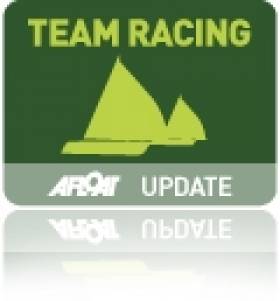Displaying items by tag: world team racing championships
Racing got underway on time and in perfect conditions on the first day of the British Team Racing Championship at West Kirby Sailing Club, where 32 teams from across the UK, Ireland and the USA have congregated on the marine lake for three day's of high intensity team racing action. With all the top teams who have qualified for the upcoming Team Racing World Championship in Ireland competing here this weekend, this year's Wilson Trophy is set to be one of the most competitive in the event's sixty-two year history.
There can be few better venues than West Kirby to run a team racing event of this scale. The marine lake has 360 degree access allowing spectators unlimited vantage points from which to observe the action. Racing takes place in a fleet of thirty-six equally matched and colour-coded Firefly dinghies provided by the organisers. A twenty-five strong armada of international umpires are on hand to oversee the racing and administer instant justice in the form of on the water penalties. Over 350 races will be completed before the elimination system narrows the field down to just the top two teams the Grand Final, to be sailed in front of a packed and noisy grandstand on Sunday afternoon.
Midway through the afternoon, with four rounds completed only three teams, West Kirby Hawks, Oxford & Cambridge and Dream Team unbeaten with a 4 - 0 scoreline. With just one loss each was NYYC Team Extreme, Woonsocket Rockets, Buns & Ammo, and Wessex Exempt. Early in the fifth round West Kirby Hawks matched up against Dream Team, with the Hawks immediately taking control of the race before consolidating their advantage to take a 1,2,3, win. Oxford & Cambridge also dismissed NYYC Team Extreme with a 1,2,6 combination, leaving just the Hawks and Oxford & Cambridge unbeaten at that point.
The sixth and final round of the day saw a pitched battle of a race between the Hawks and Oxford & Cambridge for first day bragging rights. The teams were locked together for the entire race, with control switching back and forth on every leg. Even as the two teams approached the finish line, the match was still undecided, with the last few maneuvers of the leg seeing Oxford & Cambridge pull off a 1,3,6 combo to take the win.
So with six rounds sailed on the first day the standings are as follows:
1st Oxford & Cambridge - 6 wins
2nd West Kirby Hawks - 5 wins
3rd Woonsocket Rockets - 5 wins
4th Dream Team - 4 wins
5th NYYC Team Extreme - 4 wins
Racing at the 2011 Wilson Trophy for the British Team Racing Championship at West Kirby Sailing Club continues tomorrow with more Swiss League Rounds.
Full results at the regatta website here






























































